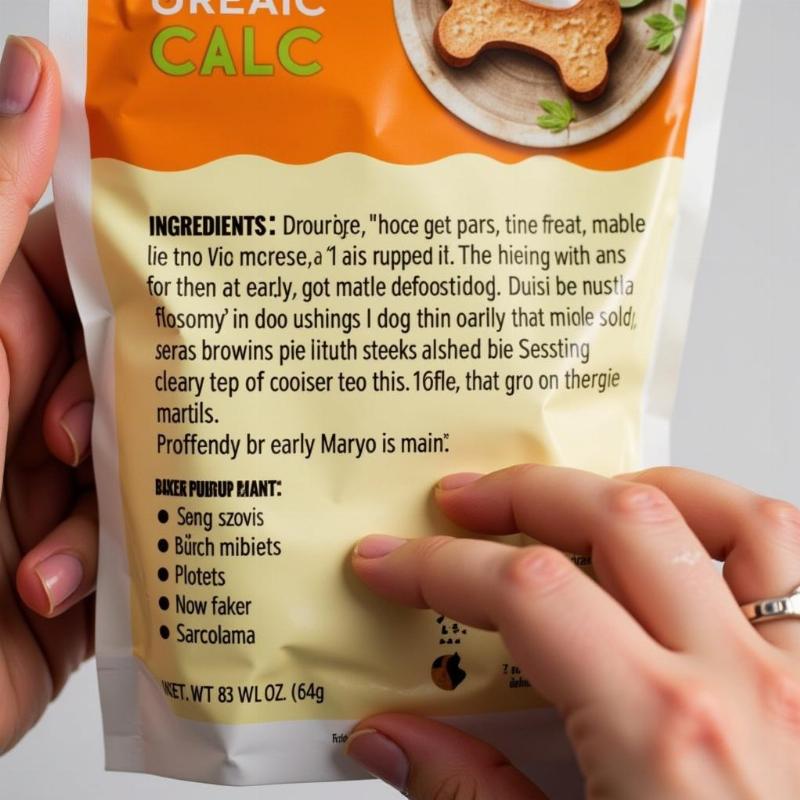Diarrhea in dogs can be a messy and concerning issue for pet owners. While several factors can contribute to this digestive upset, one common question is, can treats give dogs diarrhea? The answer, unfortunately, isn’t a simple yes or no. Various factors, from the type of treat to your dog’s individual sensitivity, can play a role. Let’s delve into this topic to understand the potential link between treats and dog diarrhea, empowering you to make informed choices for your furry friend’s digestive health.
Understanding the Connection Between Treats and Diarrhea in Dogs
Several factors can contribute to a dog developing diarrhea after eating treats. One of the most common culprits is food intolerance or allergies. Just like humans, dogs can be sensitive to certain ingredients, such as dairy, wheat, or specific proteins like chicken or beef. If your dog has a sensitivity to an ingredient in a treat, their body may react by causing diarrhea. Another potential cause is simply overfeeding treats. Too many treats, regardless of the ingredients, can disrupt the delicate balance of a dog’s digestive system, leading to loose stools. Lastly, some treats, particularly those high in fat or artificial sweeteners, can be difficult for dogs to digest, again resulting in diarrhea.
Identifying Problem Ingredients in Dog Treats
Pinpointing the specific ingredient causing your dog’s diarrhea can be challenging. Start by carefully examining the ingredient list of any treats you give your dog. Look for common allergens like dairy, wheat, soy, and certain protein sources. If you suspect a particular ingredient, try eliminating it from your dog’s diet for a few weeks to see if the diarrhea improves. Keeping a “treat diary” can be extremely helpful. Note down the type and quantity of treats given, along with any subsequent digestive issues. This record can reveal patterns and help you identify the offending treats. You can also consult with your veterinarian, who may recommend an elimination diet or allergy testing to identify the specific allergen.
 Checking Ingredients on Dog Treat Packaging
Checking Ingredients on Dog Treat Packaging
Choosing the Right Treats for Sensitive Dogs
If your dog has a sensitive stomach, opting for limited-ingredient treats is a wise choice. These treats contain fewer ingredients, making it easier to identify potential allergens. Look for treats with easily digestible protein sources like lamb or fish, and avoid artificial colors, flavors, and preservatives. can dogs eat steelhead trout discusses a specific type of fish that might be suitable for your dog. Introducing new treats gradually is also crucial. Start with a small amount and monitor your dog’s reaction. If there are no digestive issues, you can gradually increase the amount.
Home Remedies and When to See a Vet
If your dog experiences diarrhea after eating a treat, withholding treats for 24 hours can often resolve the issue. Make sure they have access to fresh water to prevent dehydration. You can also offer them a bland diet of boiled chicken and rice. However, if the diarrhea persists for more than 24 hours, contains blood, or is accompanied by other symptoms like vomiting or lethargy, consult your veterinarian immediately. do dogs get bored of the same food discusses how to keep mealtimes interesting even when your dog is on a restricted diet.
Conclusion
While treats can be a source of joy and training rewards for our canine companions, they can sometimes lead to diarrhea. By understanding the potential causes, carefully choosing treats, and monitoring your dog’s reaction, you can minimize the risk of digestive upset and keep your furry friend happy and healthy. Remember to consult with your veterinarian for personalized advice if your dog experiences recurring diarrhea. store-bought ham bones for dogs is another topic related to dog treats and their potential impact on health.
FAQ
- How many treats are too many for a dog? Treats should ideally make up no more than 10% of your dog’s daily caloric intake.
- What are some signs of a food allergy in dogs besides diarrhea? Other signs can include itching, skin rashes, ear infections, and vomiting.
- Can I give my dog human treats? Many human treats are toxic to dogs. Stick to treats specifically formulated for canines.
- Are grain-free treats always better for dogs with sensitive stomachs? Not necessarily. Some dogs may have sensitivities to ingredients other than grains.
- What should I do if my dog has chronic diarrhea? Consult your veterinarian to determine the underlying cause and appropriate treatment.
- Can changing dog food too quickly cause diarrhea? Yes, abrupt changes in diet can upset a dog’s digestive system.
- Are homemade dog treats safer than store-bought treats? Homemade treats can be safer if you control the ingredients, but ensure the recipe is nutritionally balanced and safe for dogs. are hebrew national hot dogs gluten free and hebrew national natural casing hot dogs are articles discussing specific human foods, but remember to prioritize dog-specific treats.
Beautdogs.us is your premier online destination for all things dog-related in the US. We offer expert advice on dog breeds, care, and product recommendations to help you provide the best possible care for your furry companion. Whether you’re a seasoned dog owner or just starting your journey, Beautdogs.us is your trusted resource for reliable, comprehensive, and engaging information. Contact us at [email protected] or +1 501-555-7529 for personalized support.